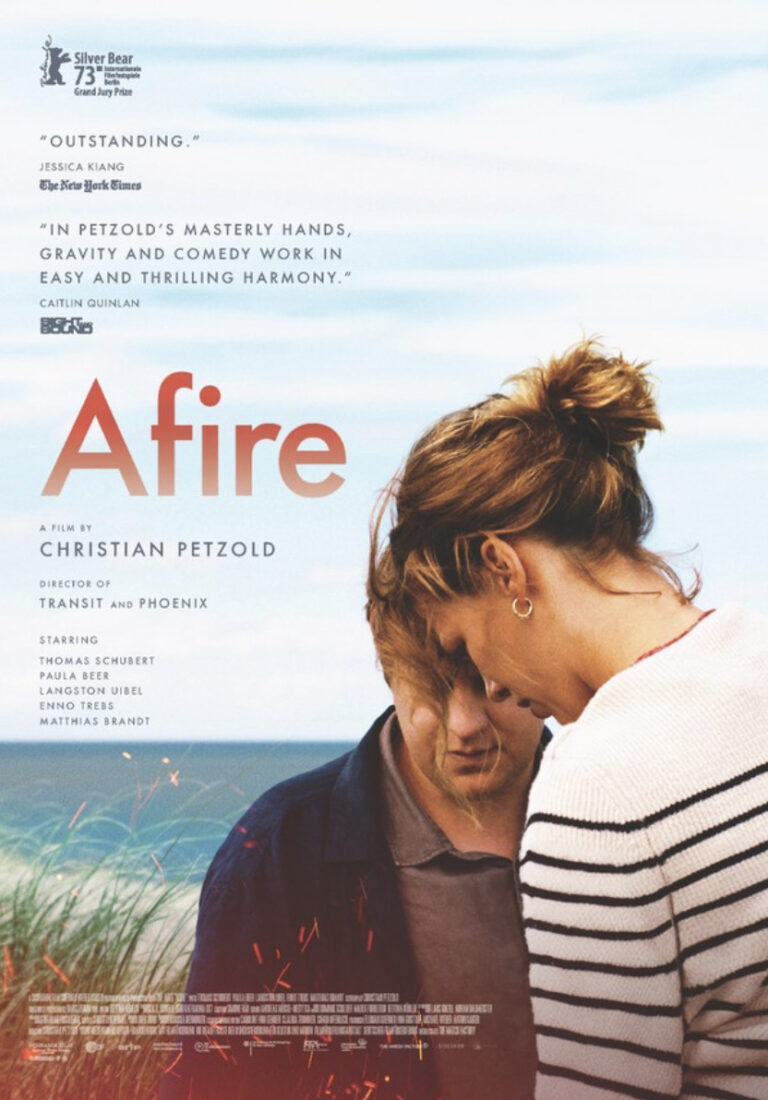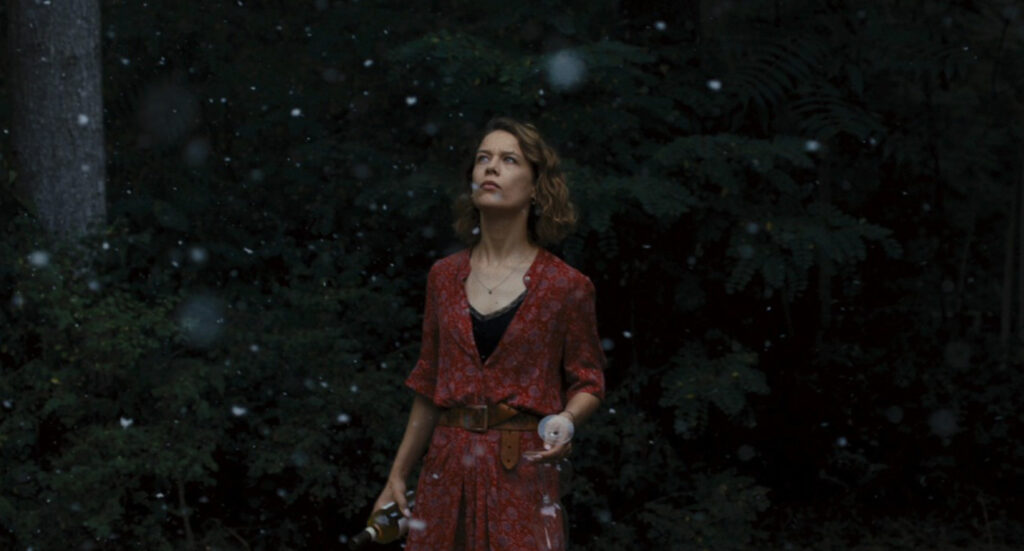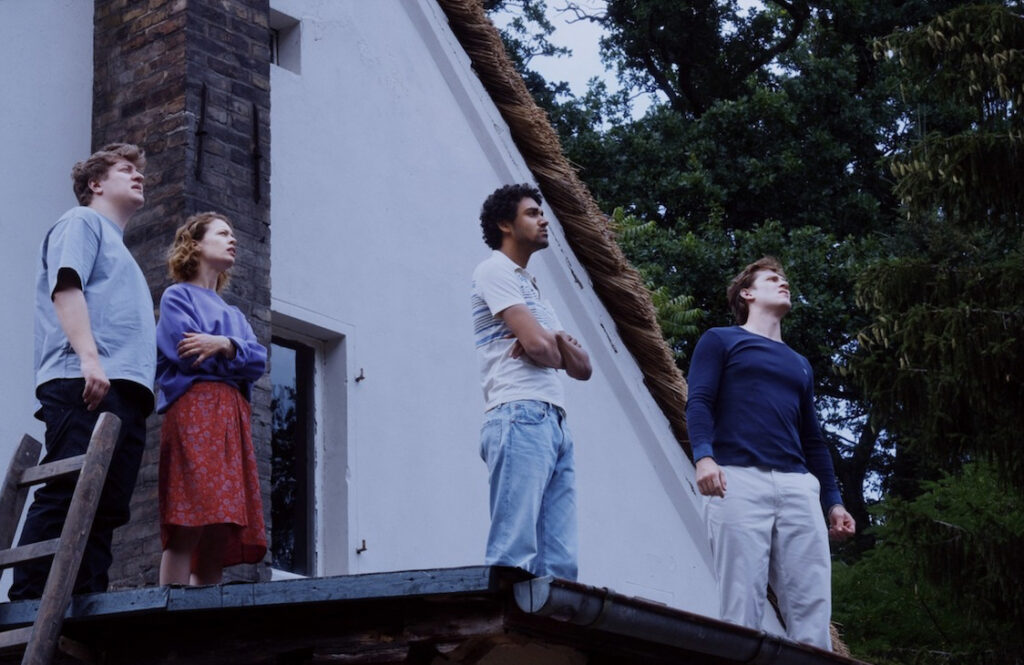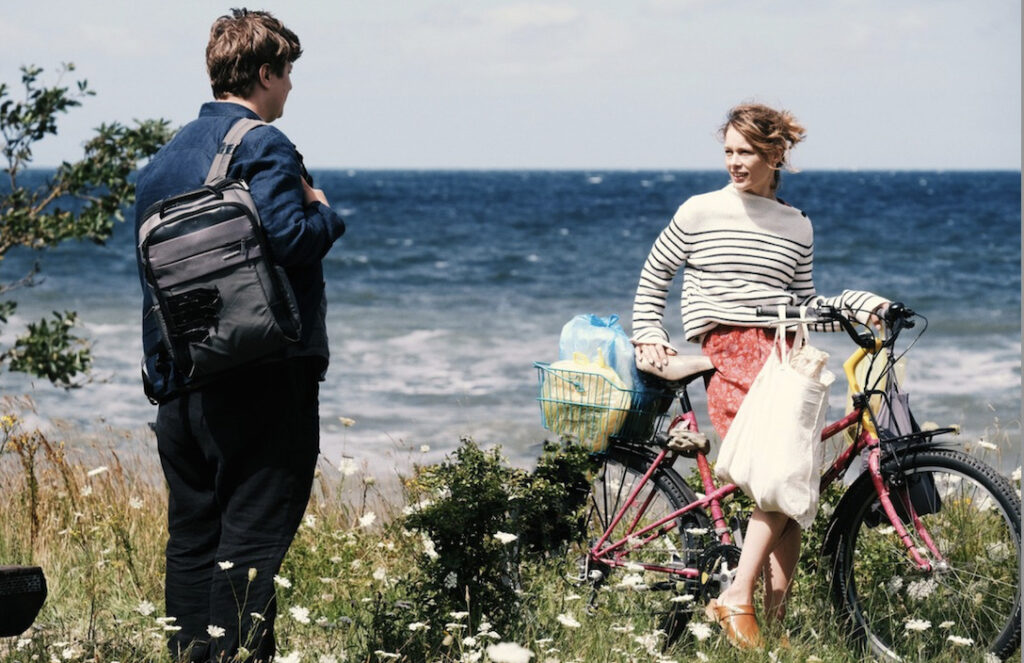
Synopsis : While vacationing by the Baltic Sea, writer Leon (Thomas Schubert) and photographer Felix (Langston Uibel) are surprised by the presence of Nadja (Paula Beer), a mysterious young woman staying as a guest at Felix’s family’s holiday home. Nadja distracts Leon from finishing his latest novel and with brutal honesty, forces him to confront his caustic temperament and self-absorption. As Nadja and Leon grow closer, an encroaching forest fire threatens the group and tensions escalate when a handsome lifeguard and Leon’s tight-lipped book editor also arrive. Christian Petzold’s acclaimed latest was the winner of the Silver Bear Grand Jury Prize at this year’s Berlin International Film Festival.
Genre: Comedy, Drama
Original Language: German
Director: Christian Petzold
Producer: Anton Kaiser, Florian Koerner von Gustorf, Michael Weber
Writer: Christian Petzold
Release Date (Theaters): Limited
Runtime:
Distributor: Sideshow / Janus Film
Production Co: Schramm Film Koerner & Weber, ZDF/Arte, Zweites Deutsches Fernsehen (ZDF)

Exclusive Interview with Actress Paula Beer
Q: When director Christian Petzold had COVID, he developed the concept of this film. You and Christian got COVID when you were doing this and you guys had a conversation afterwards. How did that conversation help to make this film and what kind of conversation did you have with each other?
Paula Beer: One day, our distributor came to us and said, “We have to wait for the speech from [French President Emmanuel] Macron tomorrow and see how the COVID situation will continue. And then we saw the next day and she was like, “Ok, we really have a problem because we can’t bring the movie to the cinema in April. Everything is going to shut down and we will try again in September, but right now, nothing’s for sure.” Then she gave us a huge box of movies, so Chris and I went back to Berlin on one of the last flights [out] with this huge bunch of DVDs.
And then, we both got COVID, stayed at home, and Berlin had the first lockdown. We both saw lots of movies and when we met again, it was a weird time. Who would have thought that this was possible — that everything’s shut down and you’re not allowed to go outside or meet whomever you want to meet.
Christian has two kids who were studying and finishing school. He really saw how it factored in or influenced them in their daily routine. He planned to do another movie which was really dark and dramatic. Then one day he said, “Well, I had enough drama during the pandemic right now so I want something light about life and want to see what’s so nice about life — who wants to see drama after COVID!? That’s how he talked to me the first time about “Afire” and his idea about doing a lighter movie.
Q: In this film, the character Leon is played by the wonderful Thomas Schubert. Leon asks Devid [Enno Trebs] about how much money he makes but he doesn’t have much of a clue what’s going around him. One of the things that was fascinating about the Leon character is that when you first encounter him, he’s a very engaging character because we see things through his view.
Paula Beer: When I read the script for the first time I was, like, “Wow, this is quite a challenge — to follow a character most of the time who’s like Leon. He’s not in a good mood, he’s pissed off because something’s not going the way he wants it to go. I’m like, “Wow, I have to follow this character.” Thomas spoke a line during the reading rehearsal for the first time and I was like, “Ok, all my worries are gone because he brings such a different vibe of comedy through himself.”
How do you say it… I like self-oriented comedies, comedy about you? I don’t know how to say that in English properly. But the way he acts is that he [expresses] a very honest view. Seeing Leon suffering and, by seeing him suffer, you’re able to sympathize with him. In the script, it’s like, “Ok, this is what it’s like to be a person like this.” I was wondering as well, in reading Nadja, “Ok, but what does she see in him?” Thomas and I were talking about that as well because he was like, “If he’s a wanker the whole time, why does she actually like him?
He’s not treating her nicely.” I liked that Nadja is really pure and she takes a lot of time until she puts out an opinion or develops an opinion about things. her being so genuine with him and being like, “You behave as an asshole, but I’ll still invite you to join the group.” I think that’s a really great characteristic that most people don’t have because normally people get really emotional or hurt. There would be no chance… I would never ask him again because he behaved like he did. She’s so forgiving in a way of being [too accepting], sometimes you just lose your temper.
Q: Probably if this film was done in 1970 or the’ 80s, your character Nadja would be probably walking around a swimming pool half naked or something like that. It could easily become a male sex object. But in this movie, what’s amazing about it is that we see her walking alone, buying food, or making a meal even though there’s guys surrounding you watching her. What were the things fascinated you about this and the character when you made it? What things triggered you to behave like this character?
Paula Beer: She’s not that classical female character whose focus is most certainly on the male character. The moment when Leon confesses his love, it takes him so much time to do so. I think normally a female character would be like, “Oh, really? Wow. I didn’t know. That’s why you behaved like this and this is why you were hurt.” She doesn’t do that at all. She’s just looking at him and then leaves the room and doesn’t comment on it. That describes what I like so much about her — that she’s doing things and knows who she is; she’s really self-confident and doesn’t need someone from outside to prove she’s right. She likes to connect with people — if they don’t want to, she’s not angry about it. It’s this whole attitude she has. It’s really rare to find female characters to be so free in a way.

Q: Was there any specific book that you were asked to read to understand this character and how she became who she is?
Paula Beer: No, Christian didn’t ask me to read anything. Of course, he gave me suggestions of things he thought she might read. I was interested in what Nadja’s life looked like. She’s not talking about her studies as well, I really like that about her that she’s not saying, “I’m studying this. I’m doing this, I’m writing for my exam.” She’s just not that person who puts herself in the room and shows off by what she’s doing. Still I was like, “OK, but when she’s writing on this exam, what is in her mind all the time? Why is she fascinated by literature or by Heinrich Heine? And what is it exactly about this? — these poems, for example.
So, I got myself books about Heine and the poems and read them. I was like, “Oh I get the idea of why she likes him. As soon as you or when she’s telling the poem and saying it’s her favorite poem that says so much about her. I personally don’t read so many poems, understanding what a poem is about and looking at poems differently [through doing this film] gave me a new view on that. For me, as my character, that was really inspiring and opened up a new world to understand in the film. Leon is a photographer who has an idea for his photo and portfolio, to shoot portraits of folks looking at the sea in his own way.
Q: How does Christian work with the actors? In a way, Christian gives you a kind of freedom. How was his approach to direction that was different from other directors — what fascinated you about his filmmaking?
Paula: Christian has own style of working. From the very beginning, I saw the first time we met, he just wanted to get to know me. We were sitting in the office of the casting director and just chatting about everything and getting to know each other. Then at one point, the casting director asked him, maybe you want to start talking about the movie. ” He said, “Yeah, sure I will.” Then he started talking about the movie. In the end, he asked me to read the script. And, if I liked it, would I like to play the character of Marie [in his film “Transit”]. From the very beginning on, he never forced me to do anything — he didn’t need proof.
He was more like, “OK, I like your work and I trust you and I just invite you to work with me.” So, the whole day of shooting with him looks so much different than any other days and other shootings because he would rehearse in the morning — just the actors and him. We, all the actors, are in costume, then the DoP has a look at the scene, then we go to make up and that’s the time when the scene or the set is prepared. When we come back, we shoot one angle. Most of the time, he’s only doing one shot, then he moves the angle to the other side.
It’s really focused and calm. Then, after a couple of hours or most of the time — it only needs one hour for one scene — we have a lunch break, then we will have time again for the next scene. In a way, it’s really focused and calm and gives you a lot of an opportunity to really dive into the story, focus on it and not be disrupted. OK, we have these 17 shots and have three more to follow. We have only 45 minutes and if not, the producer will end the day. So it’s not this pressure you have from most sets. It’s just a really nice way to work, to understand more about cinema, and the stories — how they’re told.
Q: You’ve been working since 2010. It’s been quite a long time even though you’re sitting in 2023. How do you choose the film and what kind of things that trigger you to do a part or particular film?
Paula: Sometimes I get asked, “With whom would you like to work with.” I really have difficulties answering that question because it’s always, for me, the story and it’s always the character and why the filmmakers want to do or tell the story. And that’s what I said to Christian as well. So we did our third movie together. “Now, I really love to work with you and would like to do another movie with you but for me, that’s not the reason is not enough.
We need to find a new way to come together again. Because I think film takes so much time and you give so much energy and much of your heart and soul. And that for me, it always needs this, maybe this one truth that you find in the story that you’re like, OK, but this truth makes it for me worth telling the story and taking this time. I never read scripts because, “OK, this could bring me an award because maybe the scene is amazing and the development of the character is amazing, but overall, it’s really bad.” Do I connect but does my heart get involved? I just follow my gut feeling and heart.
Q: How did you collaborate with Thomas Schubert? What kind of collaboration and bond did you create over the cell until you worked on the set together?
Paula Beer: The funny thing is that I know Thomas. I knew the cast before — I shot with them before — and Langston was the only one I didn’t know before shooting. Langston and Enno know each other. This group was not really strange to us. There were lots of connections that helped us build the chemistry quickly. From the very beginning, we were a nice group. It wasn’t hard to get along with each other so then it was easy to find our characters and be able to act off of each other.

Q: You’ve worked with a great European director such as François Ozon, Florian Henckel von Donnersmarck and Christian. Are there any directors you want to work with in the US? You speak fluent in English and could work in the US as well.
Paula Beer: For me, it’s hard to drop names because there’s so many great filmmakers. I’m sure they’ll do great movies in the future, but I feel like it always has to have… There has to be chemistry and do we too want to work together? Sometimes that’s more important than a name for me to feel like this is a very inspiring meeting. I think my next shooting will be with who’s doing the 33rd thriller. When I met him, I was like, “Wow, I’m really inspired by his vibe and how he thinks about female characters and how he thinks about stories.”
This will be my first English production. I’m just really looking forward to discovering how different it may be from German productions because on a French production or the co-production, I did feel there’s such a different energy if you combine the cultures. I’m sure working in England or America would be totally different from what I know from Germany. I would love to experience that.
Q: What’s engaging about this film is that the characters — they’re younger people — are trying to cope with their own issues and problems by themselves without their parents showing up. How much did Christian consciously create that environment that helped you open up? Did you open up yourself by doing the performance, trying to understand by playing this character who is surrounded by mainly young male actors. How much did you have any discoveries about creating the circumstances with such young actors in a way that everyone embraces it?
Paula Beer: The great thing about working with Christian is that he always has so much time for rehearsals and in rehearsals, he talks a lot about what he thinks of the scene and what reminds him of the scene. It’s often just a chat about life and what it is like and to be in this moment of this script. I think for all of us, it was really inspiring to understand how Christian sees it and how we see it and how that then turns up in the film.
I think it’s always an inspiring moment. We subconsciously understood a lot about the script and about, maybe, how it is to be a human being and how much you manipulate yourself most of the time. It was a rather natural process and we have created something that happened because we’re all really happy to be in this place and just made it happen.
Q: This one was at festivals — it’s not the first time you went there. How do they perceive your films over there?
Paula Beer: It was wonderful. I couldn’t believe it that way. And [it was] the third time in a row in the competition and we were like, “Wow, this is just really, really nice to get this.” When you’re doing it, you’re never sure how it will turn out and people will like it and be in the competition and get the Silver Bear. This is a really, really nice, big honor. There are big discussions about that in Germany right now, how our movies are produced, under which circumstances and how is the atmosphere and how is power used to create a weird situation.
And with Christian, it’s never this case. Shooting a fire was such a good experience and we had such a good time. It was just like nice people creating a movie without this crazy and we need, we have time pressure, we have money pressure and just it was just a very good time and then that leads to very good movies which are seen and honored. This, for me, means there’s hope in humanity that we can build nice things in nice ways and take care of each other, not by using power in any way.
Check out more of Nobuhiro’s articles.
Here’s the trailer of the film.
https://www.youtube.com/watch?v=Vb3brdFe3ZA

